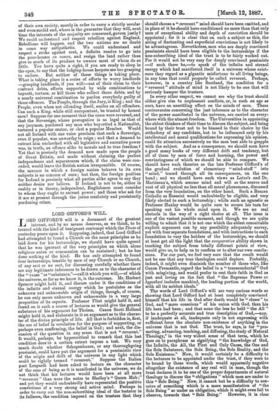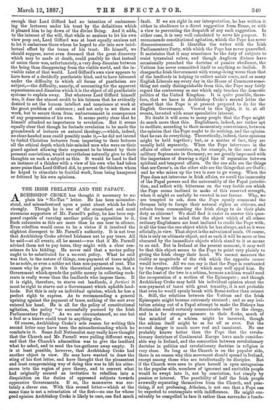LORD GIFFORD'S WILL.
LORD GIFFORD'S will is a document of the greatest interest, and by no means deserves, as we think, to be treated with the kind of benignant contempt which the Times of yesterday pours upon it. Supposing, indeed, that Lord Gifford had attempted to found a Church on the same principles as he laid down for his lectureships, we should have quite agreed that he was ignorant of the very principles on which alone religious union or communion can be sustained ; but he has done nothing of the kind. He has only attempted to found four lectureships, tenable by men of any Church or no Church, of any sect or no sect, for discussing carefully whether there are any legitimate inferences to be drawn as to the character of the " cause " or " substance,"—call it which you will,—of which the universe, so far as we know it, is the outcome. Mr. Herbert Spencer might hold it, and discuss under it the conditions of the infinite and eternal energy which he postulates as the unknown and unknowable origin of things, though, of course, he can only mean unknown and unknowable in a very large proportion of its aspects. Professor Flint might hold it, and found on it such a course of lectures as would give the general substance of his argument for Theism. Canon Scott Holland might hold it, and elaborate in it an argument as to the charac- ter of the divine principle of life. All that is forbidden is, first, the use of belief in revelation for the purpose of supporting, or perhaps even confirming, the belief in God; and next, the dis- cussion of the question in any sense that is not "reverent." It would, perhaps, be hypercritical to remark that this last condition does to a certain extent impose a test. We very much doubt whether Scbopenhauer, or any thoroughgoing pessimist, could have put the argument for a pessimistic view of the origin and drift of the universe in any light which (meld be rightly termed "reverent." Suppose the Italian poet Leopardi had been asked to lecture on the character of the sum of being as it is manifested in the universe, we do not think that his lectures would have been at all more " reverent " than were the notes to Shelley's " Queen Mab;" and yet they would undoubtedly have represented the positive convictions of a very strong and active mind. Perhaps in order to carry out the non-subscribing ideal of the testator in its fullness, the condition imposed on the trustees that they should choose a " reverent " mind should have been omitted, and in place of it he should have conditioned no more than that only
men of exceptional ability and depth of conviction should be
appointed ; for it is clear that on such a subject as this, the airing of fluctuating and superficial convictions is not likely to
be advantageous. Nevertheless, men who are deeply convinced pessimists should have been eligible to the lectureships if the non-subscribing ideal of the trust is to be fairly worked out. For it would not be very easy for deeply convinced pessimists —if such there be,—to speak of the infinite and eternal energy which had manifested itself in a universe whose exist- ence they regard as a gigantic misfortune to all living beings, in any tone that could properly be called reverent. Perhaps, however, in a country like Scotland, the condition for a " reverent " attitude of mind is not likely to be one that will seriously hamper the trustees.
In every other respect, we cannot see why the trust should either give rise to unpleasant conflicts, or, in such an age as ours, have an unsettling effect on the minds of men. These controversies concerning the just inference as to the character of the power manifested in the universe, are carried on every- where with the utmost freedom. The Universities in appointing the ablest thinkers of their time to discuss the subject, and being bound by their trust not to be biassed in their choice by the orthodoxy of any candidate, but to be influenced only by his intellectual and moral qualifications for expressing his opinion, could fix attention successively on the men best able to grapple with the subject. And as a consequence, we should soon have a good many books of very different drift and tendency, but all of them by men of force and learning, the power and convincingness of which we should be able to compare. We should have such theories as the late Professor Clifford's of the gradual evolution of elementary "mind-stuff " into " mind," traced through all its consequences, on the one hand ; and we should have such views as Loire's and Dr. Martineau's, which assume mind and will as the source and root of all physical no less than all moral phenomena, discussed from the very foundation, on the other hand. Such a Roman Catholic as Rosmini would undoubtedly be eligible, and very likely elected to such a lectureship ; while such an agnostic as Professor Huxley would be quite sure to secure his turn for speaking out his whole mind upon it. We see no real obstacle in the way of a right choice at all. The issue is one of the vastest possible moment, and though we are quite willing to admit that it is not one which the ablest conceivable explicit argument can by any possibility adequately survey, yet with four separate foundations, and with instructions to each foundation to vary the holders of the lectureships, we should at least get all the light that the comparative ability shown in teaching the subject from totally different points of view, would give us, to help us to confirm or to alter our own conclu- sions. For our part, we feel very sure that the result would not be one that any true theologian could deplore. Probably, indeed, it might even diminish the number of those who, like Canon Fremantle, regard the belief in a "transcendental" God with misgiving, and would prefer to rest their faith in God as just and loving on the fact that " the Supreme Power ex hypothesi includes mankind, the leading portion of the world, with all its noblest ideals."
The words of Lord Gifford's will are very curious words as showing that Lord Gifford had at least completely convinced himself that his life in God after death would be "closer" to God, and "more conscious" of his union with God, than his life here had been ; and that none the less he held " the All " to be a perfectly accurate and true description of God,—nay, if inadequate at all, inadequate only in not expressing with sufficient force the absolute non-existence of anything in the universe that is not God. The trust, he says, is for "pro- moting, advancing, teaching, and diffusing, the study of Natural Theology," in the very widest sense of that term, which he goes on to paraphrase as signifying "the knowledge of God, the Infinite, the Al?, the First and Only Cause, the One and the Sole Substance, the Sole Being, the Sole Reality, and the Sole Existence." Now, it would certainly be a difficulty to the lecturers to be appointed under the trust, if they were to be bound by these words, which would apparently negative altogether the existence of any real will in man, though the trust declares it to be one of the proper departments of natural theology to discuss the " obligations " which men are under to this " Sole Being." Now, it cannot but be a difficulty to con- ceive of something which is a mere manifestation of " the Sole Being " as under an obligation, which it might even fail to observe, towards that " Sole Being." However, it is clear
enough that Lord Gifford had no intention of embarrass. ing the lecturers under his trust by the definitions which it pleased him to lay down of the divine Being. And it adds, to the interest of the will, that while so anxious to let his own view peep out, Lord Gifford was at least equally anxious not to let it embarrass those whom he hoped to stir into new intel- lectual effort by the terms of his trust. He himself, we should suppose, never even dreamed that the great discovery which may be made at death, could possibly be that instead of union there was, unfortunately, a very deep disunion between the being thus disappearing from the visible world, and the in- visible ruler of that world. Lord Gifford's own view appears to have been of a decidedly pantheistic kind, and to have laboured under the difficulty to which all forms of pantheism are subject,—the difficulty, namely, of accounting for the apparent separateness and disunion which it is the object of all pantheistic systems to explain away. But whatever Lord Gifford himself was, it does the utmost credit to his fairness that he evidently desired to set the human intellect and conscience at work at the great problem of existence ; and not only to set them at work, but to secure them from embarrassment in consequence of any prepossession of his own. It seems pretty clear that he himself attached no importance to revelation. But it seems equally clear that though he forbade revelation to be made the groundwork of lectures on natural theology,—which, indeed, no clear-headed man could possibly make it,—he did not intend to forbid Christian lecturers from imparting to their lectures all the ethical depth which fair-minded men who were on their guard against allowing their argument to be biassed by their personal convictions, would nevertheless naturally give to their thoughts on such a subject as this. It would be hard to find an instance of a thinker with a view of his own who had taken more pains than Lord Gifford did, to prevent the thinkers whom he hoped to stimulate to fruitful work, from being hampered or fettered by his own opinions.



































 Previous page
Previous page